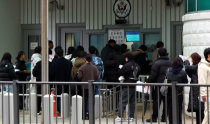Stocks Fall for Second Straight Day
Stocks Fall for Second Straight Day
Posted January. 19, 2006 03:12,
The Korean stock market has collapsed after a series of bearish factors erupted in the U.S. and Japan. Major Asian stock markets including Japan have also plunged.
On January 18, the KOSPI index closed down 36.67 points (2.64 percent) from the previous day to finish at 1,352.91. In addition, the KOSDAQ index was down 31.02 points (4.20 percent) and closed at 708.08.
Over the last two days, the KOSPI and KOSDAQ indexes fell 68.88 points (4.84 percent) and 46.89 points (6.21 percent), respectively.
On the KOSDAQ market, stock index futures declined more than six percent, and the sidecar was put in place in order to put down the slumps in the stocks while the program trading was suspended for five minutes.
The number of stashed items in the KOSDAQ market was 793, the highest of its kind in the market, and the drop was the greatest since July 22, 2002 (38.60 points).
With the collapse of stock prices, 20.6 trillion won has been lost in the stock exchange market and the KOSDAQ market during the day. A total of 37 trillion won has disappeared during these two days.
The stock crash is a result of the drop in the world stock market after a steady increase since last November, with poor performance by the U.S. IT industries such as Intel, IBM, and Yahoo combined with the stock price manipulation by Japans Livedoor and a jump in the oil prices. Despite its denial, the governments taxation on marginal profits of stock transfer policy has also played a role in fostering a restrained investment psychological environment.
As soon as the market opened, foreigners sold off a total of 310.7 billion won in the stock exchange market alone.
Japans Nikkei Stock Average, which fell 2.84 percent (462.08 yen) the day before due to Livedoors stock price manipulation scandal, closed down 2.94 percent (464.77 yen) at 15,341.18 yen.
The won-dollar exchange rate increased by 3.0 won to 992.10 won, returning to the 990 won level.
Im-Sook Ha artemes@donga.com







